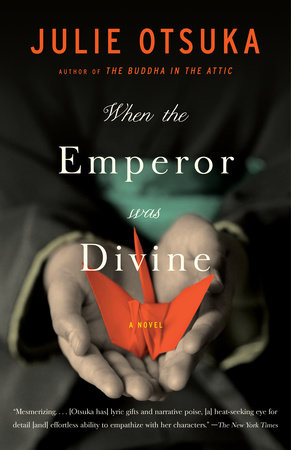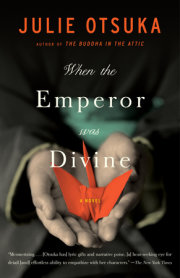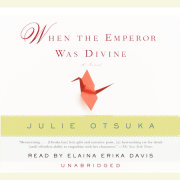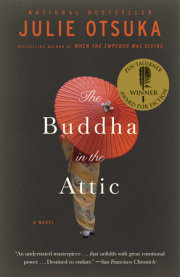EVACUATION ORDER NO. 19
The sign had appeared overnight. On billboards and trees and the backs of the bus-stop benches. It hung in the window of Woolworth's. It hung by the entrance to the YMCA. It was stapled to the door of the municipal court and nailed, at eye level, to every telephone pole along University Avenue. The woman was returning a book to the library when she saw the sign in a post office window. It was a sunny day in Berkeley in the spring of 1942 and she was wearing new glasses and could see everything clearly for the first time in weeks. She no longer had to squint but she squinted out of habit anyway. She read the sign from top to bottom and then, still squinting, she took out a pen and read the sign from top to bottom again. The print was small and dark. Some of it was tiny. She wrote down a few words on the back of a bank receipt, then turned around and went home and began to pack.
When the overdue notice from the library arrived in the mail nine days later she still had not finished packing. The children had just left for school and boxes and suitcases were scattered across the floor of the house. She tossed the envelope into the nearest suitcase and walked out the door.
Outside the sun was warm and the palm fronds were clacking idly against the side of the house. She pulled on her white silk gloves and began to walk east on Ashby. She crossed California Street and bought several bars of Lux soap and a large jar of face cream at the Rumford Pharmacy. She passed the thrift shop and the boarded-up grocery but saw no one she knew on the sidewalk. At the newsstand on the corner of Grove she bought a copy of the Berkeley Gazette. She scanned the headlines quickly. The Burma Road had been severed and one of the Dionne quintuplets–Yvonne–was still recovering from an ear operation. Sugar rationing would begin on Tuesday. She folded the paper in half but was careful not to let the ink darken her gloves.
At Lundy's Hardware she stopped and looked at the display of victory garden shovels in the window. They were well-made shovels with sturdy metal handles and she thought, for a moment, of buying one–the price was right and she did not like to pass up a bargain. Then she remembered that she already had a shovel at home in the shed. In fact, she had two. She did not need a third. She smoothed down her dress and went into the store.
"Nice glasses," Joe Lundy said the moment she walked through the door.
"You think?" she asked. "I'm not used to them yet." She picked up a hammer and gripped the handle firmly. "Do you have anything bigger?" she asked. Joe Lundy said that what she had in her hand was the biggest hammer he had. She put the hammer back on the rack.
"How's your roof holding out?" he asked her.
"I think the shingles are rotting. It just sprung another leak."
"It's been a wet year."
The woman nodded. "But we've had some nice days." She walked past the venetian blinds and the black- out shades to the back of the store. She picked out two rolls of tape and a ball of twine and brought them back to the register. "Every time it rains I have to set out the bucket," she said. She put down two quarters on the counter.
"Nothing wrong with a bucket," said Joe Lundy. He pushed the quarters back toward her across the counter but he did not look at her. "You can pay me later," he said. Then he began to wipe the side of the register with a rag. There was a dark stain there that would not go away.
"I can pay you now," said the woman.
"Don't worry about it," said Joe Lundy. He reached into his shirt pocket and gave her two caramel candies wrapped in gold foil. "For the children," he said. She slipped the caramels into her purse but left the money. She thanked him for the candy and walked out of the store.
"That's a nice red dress," he called out after her.
She turned around and squinted at him over the top of her glasses. "Thank you," she said. "Thank you, Joe." Then the door slammed behind her and she was alone on the sidewalk and she realized that in all the years she had been going to Joe Lundy's store she had never before called him by his name. Joe. It sounded strange to her. Wrong, almost. But she had said it. She had said it out loud. She wished she had said it earlier.
She wiped her forehead with her handkerchief. The sun was bright and she did not like to sweat in public. She took off her glasses and crossed to the shady side of the street. At the corner of Shattuck she took the streetcar downtown. She got off at Kittredge and went into J. F. Hink's department store and asked the salesman if they had any duffel bags but they did not, they were all sold out. He had sold the last one a half-hour ago. He suggested she try J. C. Penney's but they were sold out of duffel bags there too. They were sold out of duffel bags all over town.
* * *
when she got home the woman took off her red dress and put on her faded blue one–her housedress. She twisted her hair up into a bun and put on an old pair of comfortable shoes. She had to finish packing. She rolled up the Oriental rug in the living room. She took down the mirrors. She took down the curtains and shades. She carried the tiny bonsai tree out into the yard and set it down on the grass beneath the eaves where it would not get too much shade or too much sun but just the right amount of each. She brought the wind-up Victrola and the Westminster chime clock downstairs to the basement.
Upstairs, in the boy's room, she unpinned the One World One War map of the world from the wall and folded it neatly along the crease lines. She wrapped up his stamp collection and the painted wooden Indian with the long headdress he had won at the Sacramento State Fair. She pulled out the Joe Palooka comic books from under his bed. She emptied the drawers. Some of his clothes–the clothes he would need–she left out for him to put into his suitcase later. She placed his baseball glove on his pillow. The rest of his things she put into boxes and carried into the sunroom.
The door to the girl's room was closed. Above the doorknob was a note that had not been there the day before. It said do not disturb. The woman did not open the door. She went down the stairs and removed the pictures from the walls. There were only three: the painting of Princess Elizabeth that hung in the dining room, the picture of Jesus in the foyer, and in the kitchen, a framed reproduction of Millet's The Gleaners. She placed Jesus and the little Princess together facedown in a box. She made sure to put Jesus on top. She took The Gleaners out of its frame and looked at the picture one last time. She wondered why she had let it hang in the kitchen for so long. It bothered her, the way those peasants were forever bent over above that endless field of wheat. "Look up"' she wanted to say to them. "Look up, look up!" The Gleaners, she decided, would have to go. She set the picture outside with the garbage.
In the living room she emptied all the books from the shelves except Audubon's Birds of America. In the kitchen she emptied the cupboards. She set aside a few things for later that evening. Everything else–the china, the crystal, the set of ivory chopsticks her mother had sent to her fifteen years ago from Kagoshima on her wedding day–she put into boxes. She taped the boxes shut with the tape she had bought from Lundy's Hardware and carried them one by one up the stairs to the sunroom. When she was done she locked the door with two padlocks and sat down on the landing with her dress pushed up above her knees and lit a cigarette. Tomorrow she and the children would be leaving. She did not know where they were going or how long they would be gone or who would be living in their house while they were away. She knew only that tomorrow they had to go.
There were things they could take with them: bedding and linen, forks, spoons, plates, bowls, cups, clothes. These were the words she had written down on the back of the bank receipt. Pets were not allowed. That was what the sign had said.
It was late April. It was the fourth week of the fifth month of the war and the woman, who did not always follow the rules, followed the rules. She gave the cat to the Greers next door. She caught the chicken that had been running wild in the yard since the fall and snapped its neck beneath the handle of a broomstick. She plucked out the feathers and set the carcass into a pan of cold water in the sink.
Copyright © 2002 by Julie Otsuka. All rights reserved. No part of this excerpt may be reproduced or reprinted without permission in writing from the publisher.







